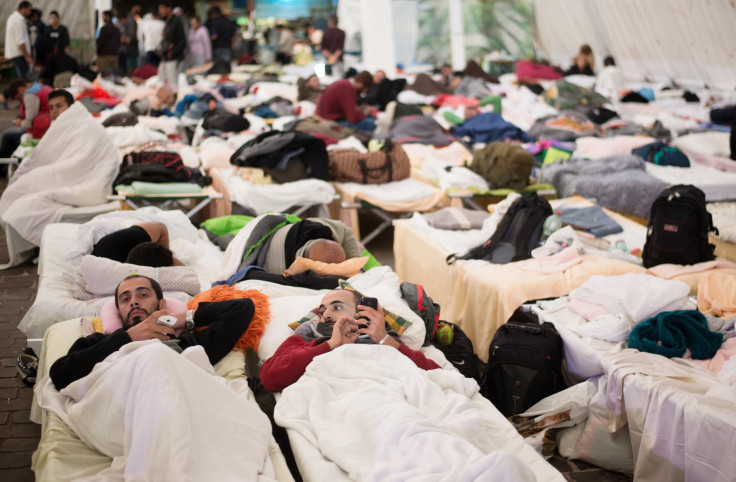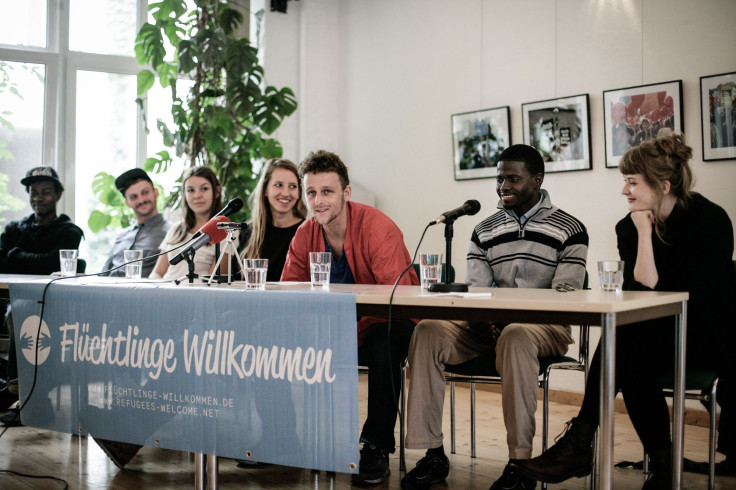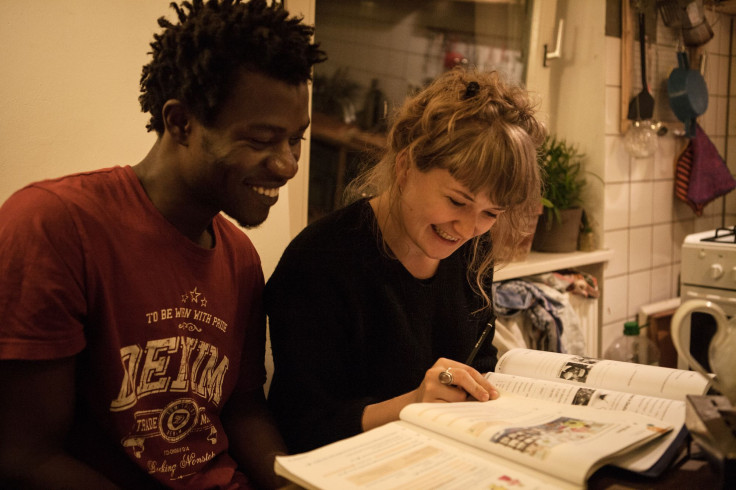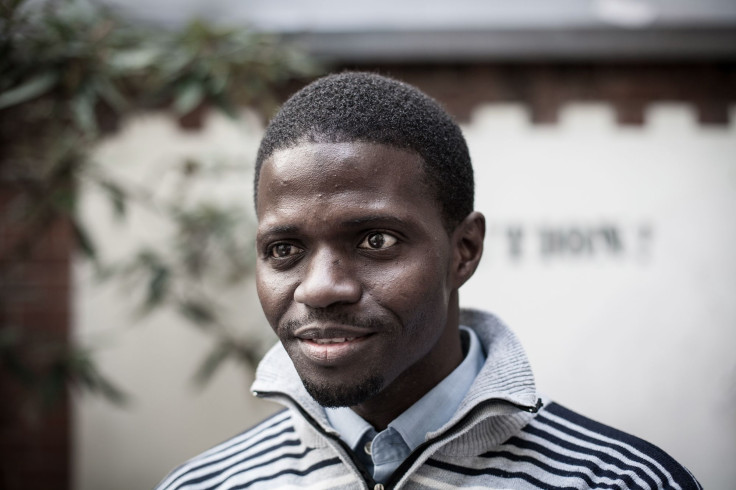Refugee BnB or Refugee Tinder: Why German Citizens Are Taking Asylum-Seekers Into Their Homes

BERLIN -- They could be the members of a hot new band: curls and caps on the boys, artfully dishevelled locks for the girls, and on-trend clothing for all. But this Berlin quartet isn't the latest indie-rock sensation. They’re making headlines as creators of a website that matches refugees with German citizens and enables them to live together.
Mareike Geiling is a gamine 28-year-old, elegant in black. Jonas Kakoschke is her rakishly bearded boyfriend. The pair are discussing their initiative, along with two other collaborators, in the aptly named House of Democracy and Human Rights. The building’s name harks back to the dying days of divided Berlin, when a growing civil rights movement threatened to overwhelm the communist government in the eastern half of the city.
A quarter of a century later, it’s home to over 70 liberal and left-wing organizations -- Amnesty International, Engineers Without Borders and the local Feminist Party all have offices here. Now, for a few hours on a Tuesday afternoon, it’s a meeting space for Fluchtlinge Willkommen (translation: Refugees Welcome).

The couple had the idea for the project last November. Geiling, a French and German major, was teaching in Cairo. Kakoschke, a graphic designer, was living in their shared apartment in Wedding, a working-class neighborhood in north Berlin. The refugee crisis was getting worse. This was the month when Italy announced the end of its yearlong Mare Nostrum search and rescue naval mission to tackle the immigration spike, citing costs of 9 million euro a month, which the European Union was unwilling to supplement. In that year 3,500 people had died attempting the perilous Mediterranean crossing from the Middle East and Africa, and European newspapers were suddenly full of stories of drowning migrants -- men, women and children.
For the refugees who made it to Europe, “home” was mostly a mass migrant camp, overpopulated and under-resourced. “Many, many people live in the camps,” Geiling told International Business Times. “They’re not allowed to work and often there’s not a lot to do, so people get bored and depressed.” Geiling thought she should be doing something to help. She wasn’t sure what, but she did have a spare room, and that sparked the idea. “I was talking to Jonas and thought, ‘We can do something with this.’” Kakoschke, a programming whiz, quickly got the website up and running, to connect hosts and refugees.
Under their program, refugees are expected to pay rent, but most are subsidized by government grants or charitable donations from the hosts’ friends and families. The site allows refugees and potential hosts to register their interest, after which a preliminary meeting is set up to assess whether the potential roommates will get along.

The format is not unlike a dating site -- one volunteer jokingly refers to it as “Tinder for Refugees” -- and as such, it’s not without pitfalls, Geiling admits. “Sometimes we have to remind people that it’s not a mail-order service.”
Strange and sometimes seedy requests are not unusual, Sophie Mirow, a recent addition to the Fluchtlinge team, told IBT.
“There are many people who want to host a vegetarian or vegan refugee, and we have to explain that these dietary restrictions are a luxury that refugees can’t afford in their home countries.”
Sometimes people offering to host refugees are specific to the point of absurdity -- for example, one couple's request to take in a “25-year-old gay Syrian Christian ” -- and the team has to ask them to be more open-minded in their search.
Occasionally there are requests for young women from men hoping to combine the benefits of a dating site and a refugee rehoming service. “We’ve had messages saying, ‘My parents want a young woman to live with me because I’m not married and I’m looking for someone,’” Mirow says. Others have said they want to live with a refugee but stipulate “no Muslims.” Unsurprisingly, such requests are rejected.
Since the project started, the team has had more than 4,000 applications from people asking to take refugees into their homes. Mirow estimates that about three-fifths are serious applicants. Of those, two-thirds are serious enough to the point of accepting refugees into their home. They’ve had 85 matches in Germany and another 50 in Austria. The group has received emails of interest from people in 44 different countries, and in the next month Refugees Welcome is launching in six countries in central and southern Europe.

The numbers matched with hosts are small compared to the numbers of refugees coming in -- more than 200,000 refugees applied for asylum-seeker status in Germany in 2014 and up to 800,000 are expected by the end of this year -- but each match makes a huge difference to those they help.
Before Bakary Konan met Kakoschke and Geiling, he was sleeping on a classroom floor. The 40-year-old jewelery maker, a refugee from Mali, arrived in Germany a little under two years ago. He spent his first month on the streets, bitterly cold in a Berlin winter. When he started German lessons, he would sleep in the classroom. On hearing about the project, his teacher put him in touch with Kakoschke. They lived together for six months, and Konan says the opportunity changed his life. “I’m not sure where I’d be now if Jonas and Mareike hadn’t offered their room.”

For Konan, the room is more than a place to sleep; it’s a means of integrating into German society. “Since I moved in, I’ve had so many great experiences. Berlin is our city now. Everyone knows us [the refugees] and treats us well.”
But the program is not without its critics. The group admits to receiving hate-mail from right-wing individuals and those who’d prefer Germany’s borders to remain shut to outsiders. Although poorly attended, Nazi rallies against refugees have taken place in cities across Germany in response to the surge. On Monday, 500 anti-refugee protesters broke through police lines and demonstrated on the streets of Leipzig. Even for those less vocal in their opposition, polls indicate that almost two-thirds of Germans think Germany should not continue to accept as many refugees as it is doing now.

That has not stopped growing numbers of Germans from giving their support to refugees. At train stations, locals have applauded new arrivals and handed out toys and candy to children. Outside the asylum registration center in Berlin, dozens of Germans -- Muslim and atheist, black and white, old and young -- are working as volunteers.
Tarabaz, who declines to give her second name, is the German-born daughter of Lebanese refugees. Her father came to Germany three decades ago during Lebanon’s civil war. The 22-year-old business student wants to repay the kindness that was shown to her family back then.
The desire to give back is a common one.
Sarah Wenzinger, blue-eyed and flaxen-haired, is the picture of archetypal Germanic beauty. But her reasons for living with a refugee are not so different. “My grandparents were refugees from Poland during the Second World War, so I think it is right that I help the next generation,” she says.
The motto of these supporters might read, “We are all refugees.”
© Copyright IBTimes 2025. All rights reserved.





















